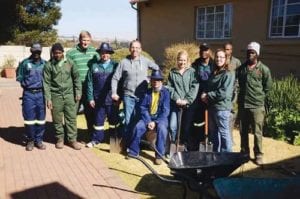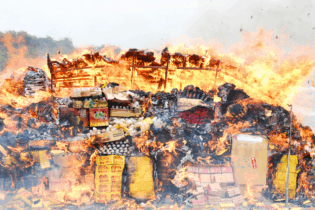Christine Beukes, managing director of Oilkol, believes that, while technology is an important factor in building a sustainable future, respect for the environment is truly vital.
Collecting, handling, disposing or treating waste has become a specialised operation in South Africa and is for tunately better regulated than ever before. This is an important step as waste is being generated at an ever-increasing rate and, if nothing is done to address this, we will end up living amongst our trash. More regulations mean improved record keeping and information systems, making access to important data easier than ever before. In embracing the age of information technology to the full, Oilkol is wired for waste in more ways than one. The company has not only set the standard for the collection of used oil and related waste, but also leads the way in electronically keeping track of this. The recording process should be taken full circle to not only record the waste and end-of-waste details, but include the sale and distribution of new products that end up as hazardous waste. This comparison is what will, in the end, determine the success of becoming ‘waste intolerant’. Since their ISO 14001 certification in 2001, Oilkol deployed an electronic system called Zoom In Zoom Out (ZIZO) and the company has become ZIZO’s SADEC agents. Says Oilkol managing director Christine Beukes: ‘What makes it a useful tool is the fact that it is linked to our database software and our everyday operations are being managed using ZIZO. This is an important link in the chain to electronically integrate all our customers into our Environmental Management System. Any measures South Africa introduces, however, will not make a difference if the elephant in the room is not addressed – RESPECT.‘Many problems in South Africa are the result of a great lack of respect. We have lost respect for ourselves and others and, as a result, we have lost respect for the environment. Unless we, as a nation, change this dangerous attitude, we will pay the price.’ Oilkol’s activities are driven by respect for the environment, says Beukes. ‘This respect forms an integral part of everything we do, including our contact with nature and our countrymen. Oilkol has made a conscious decision to make respect the theme for our operations and in the process hopefully become a leader in changing attitudes.’
In the interests of public health and the constitutional right to a safe and clean environment, hazardous waste and waste disposal processes need to be controlled. Beukes believes we have not yet adequately dealt with the hazards or waste disposal. ‘We are living in an environment that is slowly poisoning us, as much as we have poisoned it. This is a vicious circle in which we find ourselves and, although we as humans are fairly resilient, this is not a fight we are easily going to win. Respect is a strange phenomenon: you might lose it and decide to live without it, or you may be forced to become respectful again and balance will be restored. ‘We now find ourselves out of balance, and part of a disrespectful community. How do we restore the balance? Well, we can take action and restore it or nature certainly will. The planet will survive – as we have seen at Chernobyl and Bikini Atoll – but humans certainly will not. If we do not clean up our act, we will not survive. We need to take lessons from the more respectful societies – like hunter gatherers – to relearn how to respect our environment and rebuild a symbiotic relationship with it. In South Africa, the San people of the Kalahari have this sense of respect for everything around them. We need to take this opportunity to learn from each other,’ concludes Beukes.






